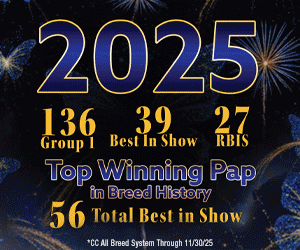The Cutting Edge of What?

By Amy Fernandez
This year’s Westminster Week media blitz included the debut of Dognition. Variously billed as cutting edge training and groundbreaking research on canine intelligence, I was braced for something spectacular.
It’s the brainchild of Brian Hare, an associate professor in evolutionary anthropology at Duke, and his wife, science journalist Vanessa Woods. Their co-authored The Genius of Dogs, was timed for release with the Dognition toolkit, app, and website. Hare’s done noteworthy research on canine comprehension of human signals. This led to his Canine Assessment Toolkit to better understand the mechanics of canine problem solving.
Now, everyone can partake. Owners complete a personality questionnaire about their dog and utilize Dognition’s exercises to assess traits like empathy, memory, and reasoning. The results are evaluated by Dognition’s scientific advisory board and owners receive profiles detailing their dog’s cognitive strengths, and suggested interaction strategies based on that.
This really isn’t a new concept. Canine thinking styles and motivations have been examined by experts like Stanley Coren in The Intelligence of Dogs, and Steven Budiansky in The Truth About Dogs. However, Hare is certainly qualified to provide new insights. That’s what I hoped for from this book. Instead, much of it is a thinly veiled attack on training methodology based on classical and operant conditioning, which the authors dismiss as outdated.….I’m not sure about that. Karen Pryor’s Don’t Shoot the Dog, and Jean Donaldson’s The Culture Clash are just a couple of influential books that redefined training protocols with techniques based on principles of learning theory.
Dognition recommends scrapping that nonsense in favor of Cognitive Dog Training. It’s based on the fact that dogs read and interpret intention signals and human gestures. But Dognition makes an unscientific leap from there proposing that they also infer behavior guidelines from this information. In other words, they are preprogrammed with some sort of moral compass and drive to please us.

Overall, cognitive dog training draws generously from concepts of cognitive behavioral therapy popularized by Aaron Beck and Albert Ellis in the 1960s. For dog owners, that’s irrelevant, so I’ll skip the details. By then, I was skimming the book until I got to the part about Hare’s failure to train his own dog. Say what? His final solution for his incorrigible pet was castration. (Not sure what Beck and Ellis would say about that approach to cognitive behaviorism).
Anecdotes, personal views, and scientific data are entwined to the concepts. Mainly it’s confusing, but it will appeal to inexperienced consumers seeking newer, nicer solutions for canine misbehavior.
Admittedly, books like The Culture Clash and The Truth about Dogs offered harsh assessments of canine motives. But they effectively reset the dial to evaluate canine behavior. I thought we had said farewell to notions that dogs understand our rules, misbehave for spite or jealousy, or feel guilty. Maybe not…
But that’s not what really caught my attention. Dognition’s $59.95 Canine Assessment Toolkit is touted as the Myers Briggs Type Indicator (MBTI) for dogs. The MBTI is is a psychological assessment test once favored by career coaches, marriage counselors, and marketing firms. It was based on Jung’s theories of personality types. Similarly, Dognition categorizes dogs into archetypes: Ace, Stargazer, Maverick, Charmer, Socialite, Protodog, Einstein, Expert or Renaissance Dog. The MBTI underlying theories remain unproven, and its value as a psychological determiner is considered questionable at best.

Despite this, Dognition is compiling a database from these profiles. Subscribers paying $129.95 for annual memberships are called “citizen scientists… contributing to the greater good of all dogs”. In an interview, Hare noted that data collected in its first month far surpassed what researchers typically amass in two years. However, this is subjective data, derived from an unscientific test, collected under random conditions. Even so, Dognition is sorting it to reach conclusions regarding variations in canine intelligence, which will presumably be marketed as such to researchers.
I’m not convinced of Dognition’s value for training, but this is cutting edge marketing for sure.
Short URL: http://caninechronicle.com/?p=18080
Comments are closed











